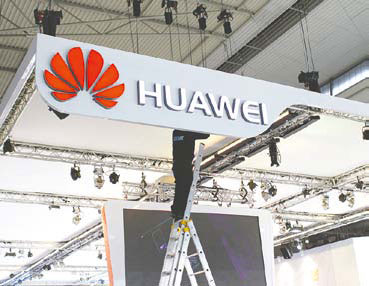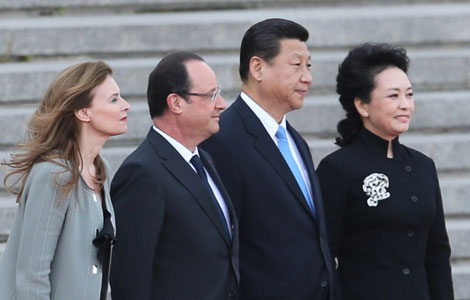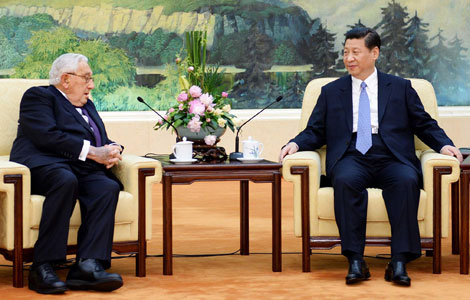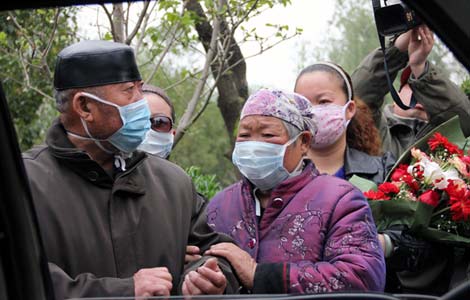Huawei poised to expand business in Canada
Updated: 2013-04-26 11:27
By Eddy Lok (China Daily)
|
||||||||
|
A technician prepares lights hanging above the Huawei Technologies Co pavilion at the Mobile World Congress in Barcelona in February. The world's second-largest mobile equipment maker and one of the most globalized Chinese companies plans to introduce more products in Canada. Angel Navarrete / Bloomberg |
Huawei Technologies Co Ltd, China's telecommunications giant with a global business in routers and other telecommunications equipment, is poised to introduce innovations for carrier operators in Canada, including new smartphones.
Scott Bradley, Huawei's vice-president for corporate and government affairs in Canada, said the company continues to do very well in Canada, with customers in almost every province and territory stretching six time zones from the Atlantic Ocean to the Pacific Ocean.
"We are adding new carrier customers and expanding our business with current operators here in Canada," he told China Daily.
While Huawei boosted sales and gained market share in Europe, Africa and Asia last year, it encountered obstacles in markets such as the United States and Australia on national security and cyber espionage concerns. A US congressional subcommittee report indicated that equipment from Huawei, its rival ZTE and other Chinese vendors pose a security risk, but investigations revealed no evidence linking the vendors' gear to espionage.
Despite what it called unfair and unsubstantiated attacks on its integrity and business intentions and operations, Huawei has won significant contracts in Canada and elsewhere, with 103 billion yuan ($16 billion) in first-half revenue last year. Major customers in Canada include Telus Corp, BCE Inc, Canada's largest telephone company, and Wind Mobile of Toronto.
Bradley told China Daily that the company works openly and is transparent with customers and Canadian authorities.
"We have been doing so (open and transparent) since coming to Canada in 2008," he said. "We have always complied with Canadian guidelines and will continue to do so. As we continue to grow our business and add new customers, this practice continues."
The Shenzhen, Guangdong-based private company is the world's second-largest telecom gear company after Sweden's Telefonaktiebolaget L M Ericsson and operates in 150 countries.
Huawei was founded in 1987 by Ren Zhengfei, a former technician in the People's Liberation Army. He began reselling other companies' gear and then started making routers and switches, the core components of phone and Internet networks. The company is poised to overtake Ericsson AB, as the world's largest maker of wireless network equipment.
Huawei is also looking at developing and expanding its device and enterprise businesses, starting this year, Bradley said. "We believe they will be a positive addition to the consumer mobile market and will provide wireless customers with good quality, affordable and reliable handsets," he said.
Bradley said Huawei is mindful of the need to build trust and assurance with the products it sells in Canada.
"We understand and appreciate that the Canadian government will take reasonable measures to ensure the safety and security of Canada's telecommunications networks as will carrier operators," he said. "We have absolutely no issue with this, and again, have been working transparently with government and carriers since 2008. They know exactly what we are doing in Canada. We want to be an important player in a healthy, thriving and innovative Canadian IT industry."
Bradley, who travels regularly between Huawei's offices in Ottawa and Toronto, said the company has long-term commitments to Canada.
"We continue to invest in Canada. We now employ over 500 people here and our Canada's R and D centre in Ottawa now employs 190 engineers and researchers," he said.
Bradley said Huawei also is working with a number of Canadian universities on research partnerships.
"All of these investments are part of our long-term commitments to Canada," he said. "The more people see us in the community and recognise the investments we are making to build a strong Canada operations, the more we hope people will start to look at us differently."
Innovative products like Huawei's new smartphones will help get people thinking about the company differently, he added.
The company has said it expects a compound growth rate of 10 percent in annual sales over the next five years, boosted by cloud computing and smartphone sales.
On April 7, at the company's headquarters in Shenzhen, rotating CEO Guo Ping confirmed a 32 percent increase in Huawei's 2012 net profit to 15.4 billion yuan ($2.5 billion). Revenue rose 8 percent to 220.2 billion yuan. Unaudited figures were released in January. Chinese sales were up 12.2 percent to 73.6 billion yuan. Sales in Europe, the Middle East and Africa rose 6.1 percent, Asia Pacific sales climbed 7.2 percent, and revenue in the Americas gained 4.3 percent.
Information and communications technology will continue to grow, with new opportunities coming from cloud computing, BYOD (Bring Your Own Device), and big data, and feature phones being replaced by smartphones at a faster rate, the company said in a statement.
Eric Xu, executive vice-president of Huawei said in Shenzhen recently that the company had no intention of being listed in the near future, suggesting that it is not likely to make major mergers and acquisitions due to financial pressure.
In remarks made at the 2013 Huawei Global Analyst Summit, he said, however, that Huawei does not rule out the likelihood of purchasing smaller companies for technologies or for markets to improve its competitiveness.
Commenting on the tightening of rules and regulations especially in the US to keep Chinese high-tech and IT and wireless companies and suppliers deemed high security risks from getting a foothold, Kevin Jun Ye, co-chair of Canada-China Sci-Tech Alliance, said Canada should learn to trust Chinese companies doing business locally.
"This is a sensitive topic and whether it is in China or Canada, we have to do business in line with local laws," he said. "Even with laws and regulations, we can still do business without worrying about them."
Ye said certain Chinese companies had become stronger and no matter what they do, they are seen as a threat to local industries and raise tensions, especially when an Internet hacker attack occurs.
"Canada should continue to trust companies from China as not many can threaten us," he said. "We can do business in the consumer market, like dealing with handsets and not at the government level, to avoid sensitive areas. In Huawei's case, it can shift the product lines."
For China Daily
(China Daily 04/26/2013 page11)
Most Viewed
Editor's Picks
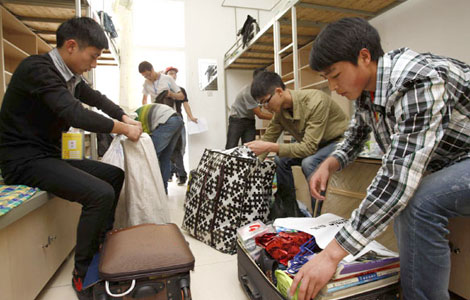
|

|

|

|

|

|
Today's Top News
Phone bookings for taxis in Beijing
Chinese consumers push US exports higher
Seoul delivers ultimatum to DPRK
Boston bombing suspects intended to attack NYC
No let up in home price rises
Bird-watchers undaunted by H7N9 virus
Onset of flood season adds to quake zone risks
Vice-president Li meets US diplomat
US Weekly

|

|
